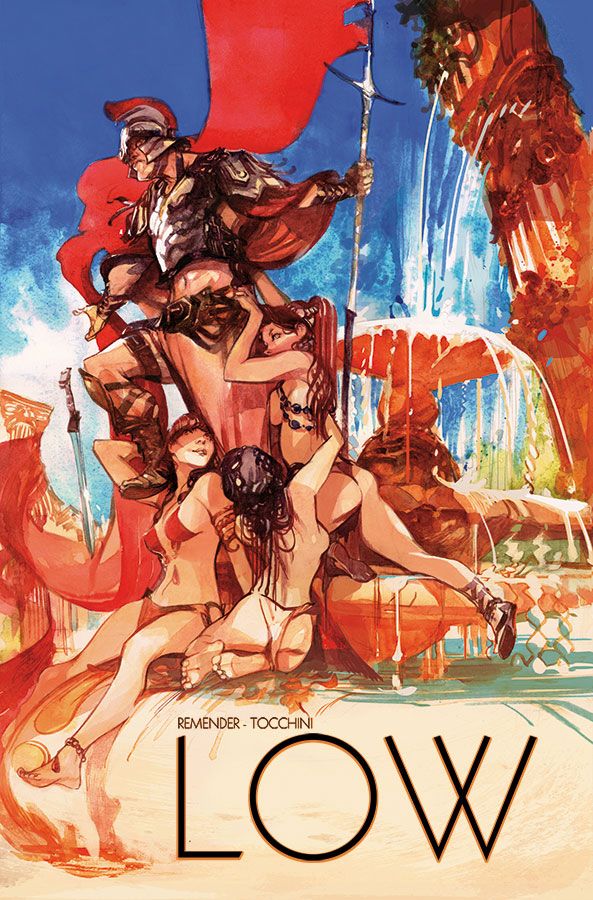The unbridled optimism of last issue gives way to a more tentative kind in Rick Remender and Greg Tocchini's "Low" #2, a decade after the heart-wrenching events that wrapped up the first chapter of this series. Optimism is the emotion that Remender centers his story around, despite its impending apocalyptic setting in a far future where the sun, approaching supernova stage, stands ready to consume the planet.
What's left of mankind has relocated to the ocean's depths to escape the ever-increasing intensity of the sun's radiation. Stel was the matriarch of the Caine family, hunters who provided for the domed city of Salas, who were all lost to her last issue save for her son Marik, a Salus police officer who seems to spend most of his time strung out with the local prostitutes. The still-mourning Stel's outlook has changed, as the positive thinking she once used as motivation to save mankind is now merely a naïve coping mechanism. Her faith is challenged, but her shaken beliefs are rooted in attitude rather than religion. It's easy to sympathize with her, but more difficult to get behind her as a character, as she demonstrates none of the pioneering spirit that was so dominating last issue.
It's just as well, then, that most of the issue focuses on Marik, and his unintended involvement in a murder. But as part of such a far-reaching story, Marik's part in it seems rather pedestrian; he may or may not be a hero in the making, but at this point there just seems to be too much page time given to the consequences of his involvement with a prostitute. Remender makes sure there's next to nothing to like about this character, but succeeds a little too well; if there's any redemption coming, it sure seems a long way off and at this point, it would be just as satisfying to see him behind bars.
Whether the scene is the slums of Salas or its glistening high-rises, though, Tocchini brings a lush, colorful beauty to all of it. Readers are sold on the artistic merits of the comic as soon as they spy Tocchini's stunning cover, although exactly how a Roman gladiator fits into the story isn't made apparent until a few pages in. Once inside, readers are treated to page after page of gorgeous, wall-to-wall colors and almost surreal imagery. Marik's pastel-colored dream world is every bit as beautiful as Marik undoubtedly envisions it, and Tocchini uses a shift to darker colors when Marik snaps out of his stupor.
The Caine family abode, now largely Stel's shrine to her lost family, has a haunting kind of beauty that embellishes her character's current state of mind beyond what Remender's script already has. Floating oval photographs of past times in front of the circular viewing window that overlooks Salus, dominated solely by orange and yellow shades in one image, and purple and blue in another, make for an attractively designed setting that's simultaneously beautiful and sad. All of this color is nicely contrasted later on, in a scene that's the futuristic equivalent of Stel visiting the guru on the mountaintop, that's has only a stark white background. The exact nature of this environment is a little uncertain, but largely irrelevant to the overall story.
The title "Low" is in reference to the cities mankind has built deep beneath the ocean, but Remender clearly has other meanings in mind, as well. Stel is at an understandably low point in her life, and morale is low in the starving and crime-ridden undersea city. "Low" #2 itself doesn't quite match up to the higher standard set by the first issue, but works well enough as the second chapter to a larger story, and is carried by the stylish and picturesque images.

